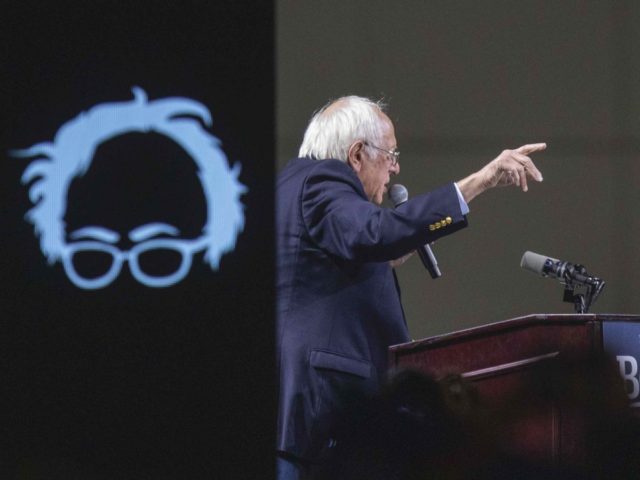Sen. Bernie Sanders (I-VT) dropped out of the 2020 presidential race on Wednesday, having moved the Democratic Party — including presumptive nominee Joe Biden — further left than ever before.
After 2016, veteran Sanders aide Jeff Weaver wrote a book, How Bernie Won. He could very well write a sequel today.
From “Medicare for All” to the “Green New Deal,” Sanders and his policies defined the 2020 race, and have shaped the views of the next generation of Democratic leaders.
At first, it was not clear Sanders would try again in 2020. By 2019, he was already 77 years old, and would have turned 80 during his first year in office.
His acolytes already filled the halls of Congress: Rep. Alexandria Ocasio-Cortez (D-NY), a Sanders supporter in 2016, rose from obscurity to prominence, leading a “Squad” of fellow “democratic socialists” who brought radical ideas into the mainstream of political debate. Sanders could easily have passed the torch to that new generation.
Instead, Sanders decided to try again. And why not? Despite his age, he had more energy than candidates half as old.
On more than one occasion, in covering Sanders, I saw him move so quickly that journalists fell down trying to keep up with him. Even a heart attack in October could not keep him off the trail for more than a few days.
Sanders’s political appeal is his “authenticity”: his beliefs have hardly changed, even after the Cold War. But he has showed an ability to adapt, both tactically and ideologically.
For example, his campaign had long since mastered the streaming video technology that has recently become essential — and with which his former rival still struggles from his bunker in Delaware.
And when “AOC” introduced the “Green New Deal” — and its impossible goal of moving to 100% renewable energy by 2030 — Sanders seized it.
So, too, did almost every one of the more than two dozen Democratic presidential candidates. Even former New York City Mayor Michael Bloomberg, who would later emerge as a Sanders nemesis, embraced the idea of the “Green New Deal,” though he promised his would be more “achievable.”
Then there was “Medicare for All,” Sanders’s proposal to expand the popular program for those over 65 years old to cover every single American, replacing private health insurance entirely.
When Sanders first ran on “Medicare for All” in 2016, it was considered a radical proposal. By 2019, it had become the default policy for almost the entire Democratic presidential field.
The only notable dissenters — Biden and South Bend, Indiana, Mayor Pete Buttigieg — still included Medicare as an “option” for all. That idea was itself so radical that when Democrats considered it in 2009, during the debate over Obamacare, they rejected it: it was far too socialist to pass.
All agreed with Sanders when he called health care a “human right” — one that the federal government had to guarantee.
Video Source: Bernie Sanders / YouTubeSanders pushed the field so far to the left that Bloomberg and other potential rivals — even Sen. Sherrod Brown (D-OH) — decided they did not have a chance. He struggled to remain competitive, as other, younger, more “diverse” candidates — especially Sen. Elizabeth Warren (D-MA) — simply copied his ideas.
But after the Iowa debate in January 2020, when many voters looked at their choices and felt none could beat President Donald Trump, Sanders became a sentimental favorite. If the Democrats were going to lose, better to go down, some felt, with a candidate whose beliefs actually reflected their own.
The “democratic socialist” from Vermont won the popular vote in the first three primary states, the first candidate from either party ever to do so. In Nevada in February, he nearly won an outright majority. Biden won South Carolina — but he had been expected to do so.
And then, in one of the most remarkable 48-hour periods in American political history, the entire party establishment, and almost all of the other frontrunners, swung behind Biden before Super Tuesday. The race was over.
Biden’s Super Tuesday wins, and the coronavirus outbreak, changed everything. The latter has made Sanders’s preferred campaign methods — rallies and door-to-door voter outreach — impossible.
Sanders did not drop out completely on Wednesday; he is holding onto his delegates, the better to ensure he keeps “winning the ideological battle.”
And there is no question he has won it.
On every issue, Sanders forced Biden to the left. The former vice president now wants to give free health care to illegal aliens; to eliminate the fossil fuel industry; to spend federal funds on abortion; and, most recently, and to make public colleges “free” for those from families earning up to $125,000.
Sanders will be on the ballot in November in all but name. His “democratic socialism” now defines the party. That is the choice America faces.
Joel B. Pollak is Senior Editor-at-Large at Breitbart News and the host of Breitbart News Sunday on Sirius XM Patriot on Sunday evenings from 7 p.m. to 10 p.m. ET (4 p.m. to 7 p.m. PT). His new book, RED NOVEMBER, is available for pre-order. He is a winner of the 2018 Robert Novak Journalism Alumni Fellowship. Follow him on Twitter at @joelpollak.

COMMENTS
Please let us know if you're having issues with commenting.